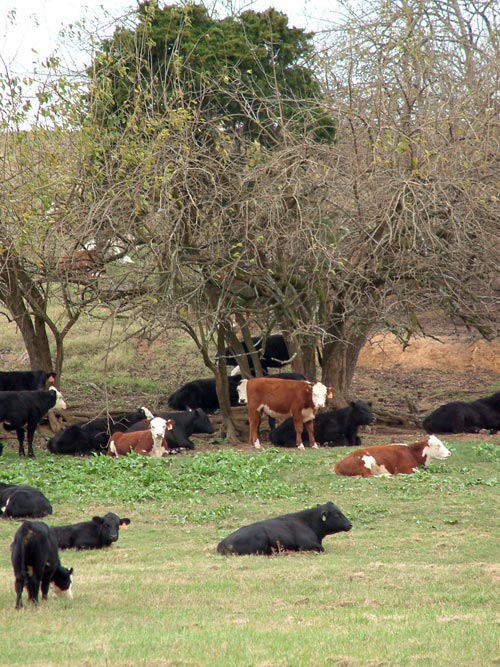
Cows with poor temperaments can affect the entire herd and reduce producers’ bottom lines.More docile cattle are going to have less sickness, gain weight better, do better in pastures and be more productive for the producer throughout their entire life span.Anxious, aggressive cows become sick more often, have more difficulty gaining weight and damage farm equipment.Cow behavior even affects meat tenderness, as certain hormones such as cortisol and enzymes remain at higher levels in stressed-out cattle, possibly toughening the muscle.
January 21, 2011

Recent research has demonstrated the value of cattle with calm temperaments and the price producers pay for keeping wilder animals in their herds.
A five-year Mississippi Agricultural and Forestry Experiment Station study found that cows with poor temperaments can affect the entire herd and reduce producers’ bottom lines.
Rhonda Vann, MAFES associate research professor in Mississippi State University’s Department of Animal and Dairy Sciences, led the study in Raymond at the Brown Loam Branch Experiment Station.
“We suggest that producers evaluate their herds and the cattle they buy,” Vann said. “You don’t want a cow or steer that’s unreceptive, but one that’s a bit more docile. They are going to have less sickness, gain weight better, do better in pastures and be more productive for the producer throughout their entire life span.”
Vann said the most applicable findings in her research is to cull cows with poor temperaments out of the herd.
Researchers measured how a trio of cows behaved while in a 12-by-12-foot pen and how a single cow behaved while in a chute similar to what contains bulls before being released at a rodeo.
In both cases, the cows’ behavior was measured after they were approached by humans. The research also used laser technology to gauge how fast a cow traveled 6 feet after being released from a chute.
For each part of the experiment, the cows were given a score on a 5-point scale. The scale ranged from 1, describing cows as not aggressive, docile, walks slowly, easily approachable and not excited by humans to 5, describing cows as very aggressive, excitable, and out of control.
The pen scores and chute scores were nearly identical, and the higher-scoring cows almost always exited the chutes at accelerated speeds.
“The pen score measures aggressiveness, and the exit velocity measures their flight response: how quickly they want to get away from the situation,” Vann said. “Basically, the more aggressive they are, the quicker they want to get away from the situation.”
Vann said anxious, aggressive cows, or those with a pen score of 4 or 5, present a host of problems.
“They become sick more often, have more difficulty gaining weight and damage farm equipment. Their rowdy behavior rubs off on cows that would otherwise be perfectly calm,” Vann said. “Cow behavior even affects meat tenderness, as certain hormones such as cortisol and enzymes remain at higher levels in stressed-out cattle, possibly toughening the muscle. All of these problems directly affect a cattle producer’s profit margins.”
Vann said the primary factor relating to cow behavior is genetics. If a high-strung bull and a wild female mate, the result will be a high-tempered calf.
But genes do not tell the whole story. Vann said a calf’s mother usually influences its behavior more than the bull, since the mother raises the animal and provides a constant presence.
However, Vann said that all cattle are susceptible to learned behavior.
“I’d say how humans treat the animal is 25 percent of it, followed by 10 percent being the environment,” she said. “The rest would be genetics; however, we are still investigating what makes some animals more aggressive than others.”
Danny Martin, the 2009 Mississippi Cattleman of the Year, owns a ranch in Raymond and can attest to these findings from experiences with his own herd.
“Ill-tempered cows have to get antibiotics more often, and they don’t come up to eat with the rest of the cows and get the proper nutrition,” he said.
Martin said he once sent several cows to a feed lot experiment at MSU, including one that was irritable.
“When I sent the cattle, there was no more than a 50-pound difference between each of them,” Martin said. “However, when the animals returned, the ill-behaved steer weighed 966 pounds, while all the others weighed over 1,200 pounds each.”
According to the study, which was published in the “Professional Animal Scientist,” cattle with high pen scores typically incurred higher medical expenses than lower-scoring cattle.
In addition, ill-tempered cattle typically bring in $5 or $6 less per hundred pounds of body weight than do calmer animals, Vann said. An aggressive cow weighing 800 pounds may net $480 less than its non-aggressive counterpart. However, high scorers usually won’t even reach that weight since they have trouble gaining bulk.
You May Also Like



